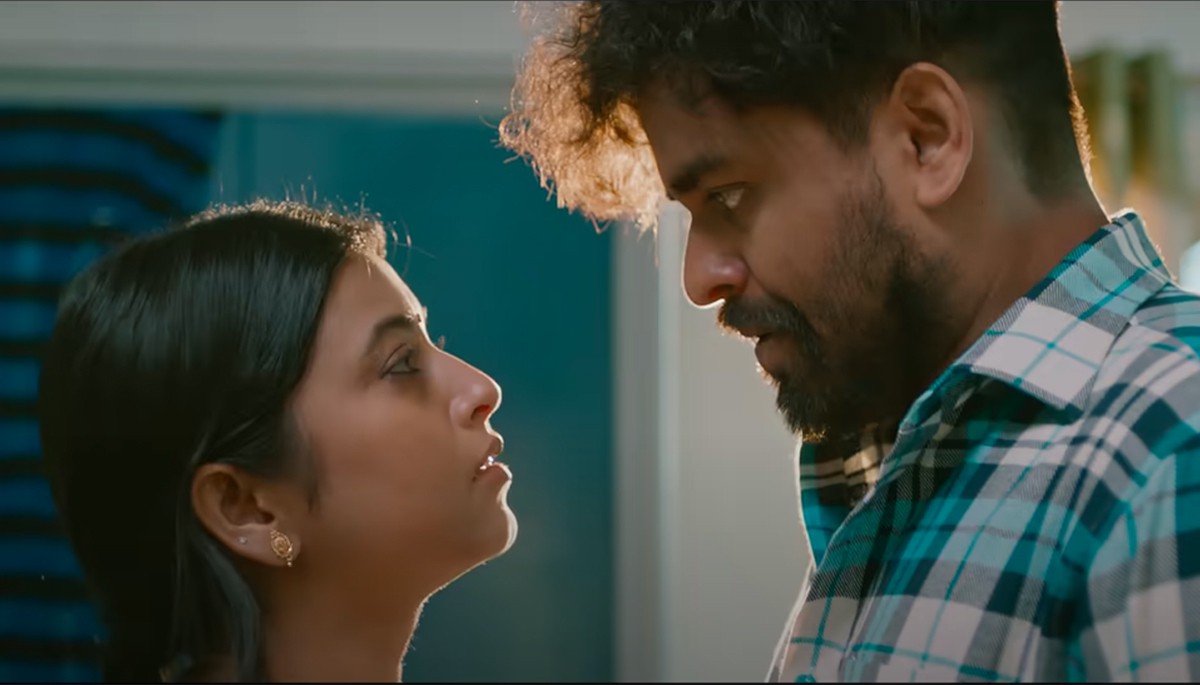On September 20th, 2024, we watched an Assamese film where the protagonist goes to extraordinary lengths to avenge the death of a loved one.
On the same day, we also saw a police officer, who investigates the case, later allowed the hero to go free, despite his actions breaking the law, because he believed that the hero’s intentions were pure. On October 18, 2024, we watched another Assamese film in which the protagonist kidnaps a few wrongdoers in the hope of seeking justice for the unfortunate death of a close one. The film ends as the villain confesses to his crimes over a Facebook Live video. A public outrage follows, with people taking to the streets holding placards demanding justice for a rape case. Amrita Gogoi was also in that film.
So, for any viewer who has watched Sikaar (2024) and Joy Hanu Man (2024), they have already watched Achinta Shankar’s Abhimannyu (2024). The plot points above belong to these two films and strange enough, Abhimannyu (2024) operates with the exact same plot points.
Having already written about the better aspects of Sikaar (2024) and Joy Hanu Man (2024), I will now try to write how Abhimannyu combines both (along with a few others) to become a decent version of the two.
To being with the story, an encounter specialist is brought in to investigate the abduction of five influential individuals of the society – a case that shakes the system to the core. Debajit Mazumdar plays Jayanta Mazumdar, a no nonsense, rebel cop who is not very fond of the system. He shows no mercy and wastes no time. Immediately after landing on the high-profile case, he orders his subordinates to trace numbers and sift through files.
 A snapshot from ‘Abhimannyu’ trailerWith all the work delegated, Mazumdar Sir flaunts a swagger and sips from his hip flask (and sometimes a coffee mug), scrolls Facebook and occasionally kill time – like he forgets the word ‘pen’ this one time and everyone else in the department tries to guess it. Like in Ready (2011) where Mahesh Manjrekar’s character struggles to find the right words and keeps saying ‘woh who’ instead of being able to recall the exact word. Classic humour.
A snapshot from ‘Abhimannyu’ trailerWith all the work delegated, Mazumdar Sir flaunts a swagger and sips from his hip flask (and sometimes a coffee mug), scrolls Facebook and occasionally kill time – like he forgets the word ‘pen’ this one time and everyone else in the department tries to guess it. Like in Ready (2011) where Mahesh Manjrekar’s character struggles to find the right words and keeps saying ‘woh who’ instead of being able to recall the exact word. Classic humour.
While Mazumdar Sir may seem perpetually intimidating at first, his means and methods are anything but. With that an attitude and pace of work, it’s some miracle that he even manages to crack the case-but only to let the kidnapper walk free later, because, well, their heart was in the right place. Duh.
On the sideline of that, Abhimannyu is also the story of Prabhat, an innocent, hardworking and ordinary man who leads a simple life running a modest roadside hotel. He marries Jyotshna, who is now the love of his life, but soon tragedy strikes as she is taken away from him. Prabhat then goes on to seek vengeance against those responsible for Jyotshna’s fate. Prabhat’s mission and Mazumdar Sir’s duty lines do cross paths, just like Shankar and Detective Pran Goswami in Sikaar. In fact, the trope of the police letting the hero-who is on the wrong side of the law-go free has already become a classic now and being late to the scene runs in our tradition.
Where were we all this time? In a party song with a Russian performer where Mazumdar Sir name drops Colonel Goswami like it’s the next cinematic universe in development. For the uninitiated this is a reference to Zubeen Garg’s character from the 2017 hit Mission China. Colonel Goswami leaves soon after, “I’ve got a new mission… Mission Russia,” he adds. This happens right after addressing the performer as “Axomor suke kune tumak Janmoni buli jane”. No kidding.
Rest of Abhimannyu is a bit of Ghajini (2008), a bit of Gabbar Is Back (2015), but with a COVID-19 subplot (just to make it feel relevant because the film is already using so many done to death tropes) and a messed-up timeline – where lockdown announcement by the PM, launch of vaccination and declaration of Assamese as a classical language happened at the same time.
And it borrows ideas so heavily from the above-mentioned films that in the ending scene when Prabhat goes to Dong valley for Jyotshna’s Asthi Visarjan (It was Jyotshna’s wish to watch the first sunrise in India) we can already sense Kaise Mujhe Tum Mil Gayi in Shreya Ghoshal’s heavenly voice. Only the footprint mold in Ghajini (2008) is replaced by Jyotshna’s Asthi in Abhimannyu. Tropes aren’t always unhealthy for movies, but the problem arises when they’re used in the most unimaginative of ways.
 A snapshot from ‘Abhimannyu’ trailerIn another scene, the five abducted individuals, before being abducted, celebrates the winning of a case in the court. A character declares, “Winning the case was very easy. You already had proof, a chargesheet and more than enough money”. Alas, the only thing missing was – logic. The very basis of the case is flawed. If a husband had to kill his wife, why would he choose a public, risky location, especially in the middle of the night at a COVID-19 health centre?
A snapshot from ‘Abhimannyu’ trailerIn another scene, the five abducted individuals, before being abducted, celebrates the winning of a case in the court. A character declares, “Winning the case was very easy. You already had proof, a chargesheet and more than enough money”. Alas, the only thing missing was – logic. The very basis of the case is flawed. If a husband had to kill his wife, why would he choose a public, risky location, especially in the middle of the night at a COVID-19 health centre?
Definitely, the prosecution had enough power and influence to arrange for false testimonies and link direct evidences to the husband to frame him, but it’s hard to understand how the motive was established. Especially when the film stresses on finding the motive behind the kidnapping cases in the investigation led by Mazumdar Sir how can it then overlook the importance of the motive in this storyline?
Also hard to understand, why the defendants did not plead for their innocence or deny the charges. The lawyers in the defence are shown watching reels during the hearing. And the judge gives the final verdict without even hearing from the defendants. Faster than fast track courts!
Abhimanyu thus becomes a film which, in order to make a point, will assert it without any consideration for reason. That is how team Prabhat is able to hijack the loyalty of cooks, maids and drivers and turn them against their employers? There are other instances where Abhimannyu wears its smartness on its heels. When asked to trace down a number, a smart ethical hacker, working for a special unit for a high-profile case declares, “Can’t trace it. The user is on a VPN, so the location keeps fluctuating between different countries.” Facepalm moment. It feels more like a convenient excuse than a real technical challenge.
Actor Hiranya Deka, who plays the role of Rahman, says to Prabhat and his friends, “the fight against injustice is like a trap-one set by the system, from which no one can escape. Just like Abhimanyu, don’t fall into this trap and end up ensnared”. Admiration to the fact that Rahman is well read and knowledgeable about Hindu mythology, but if the justification for naming the film Abhimannyu is based on the protagonist fighting against social injustice and getting caught in the system’s trap, then any film with a similar storyline can be named the same? So, naming the film after the character doesn’t seem to hold enough weight. It’s not deep and there isn’t enough of a distinct reason to choose this particular title for the film. Abhimanyu’s arc in the Mahabharat is more layered, and the film’s protagonist doesn’t quite live up to that depth.
Now after Ekalavya (2022) and Abhimannyu (2024), it only makes sense for actor Kamal Lochan to play Karna in a new film and thus complete an unofficial trilogy of sacrifice. In Abhimannyu, Kamal Lochan gives a reliably average performance but his character is so all over the place that it ultimately lacks an identity of its own. The character of Prabhat has the innocence of Forrest Gump sometimes, the madness of Radhe Mohan in Tere Naam (2003), the coldness of Denzel Washington in The Equalizer (2014) and sometimes the rage of Gabbar in Gabbar Is Back (2015). It struggles to establish a firm ground in between. Deeplina Deka has a charisma that reflects well in Jyotshna but sadly her character is designed only to wear colorful Mekhela Sador and provide emotional support and motivation to the protagonist. In the second half she is just a smile pinned to a wall.
Abhimannyu also scores for trying a non-linear narrative as it deals with the past and the present simultaneously and also jumps between multiple storylines, but it lacks an overall tonal sensibility between the cuts. It feels as though the scenes are randomly arranged, without unified by a sense of pace and emotional connect between them. For example, in the previous scene, it’s revealed that some guy named Nipon died from Covid-19. And in the very next shot, we see the family of a government contractor, Sushanta Chaliha, grieving in front of a photo of him, adorned with a garland. Then immediately, the following shot shows Jyotshna’s grandfather lying on a bed, later being taken to a hospital. And no, this is not a montage. This sequence is likely the most confusing part of the entire film.
There is only one point where the editing works the best – when Mazumdar Sir interrogates the security guard who was on duty that fateful night at the Covid-19 health camp, while, on the other hand, Aditya Hazarika confesses the truth about that night to a Facebook live audience. As the confession of Hazarika and the answer of the security guard converge, we cut to that scene.
And its high time, filmmakers from Assam hire a proofreader for the English subtitles. The problem of erroneous subtitles is getting more than common with every new Assamese release these days and Abhimannyu is no exception to this. I hope that any filmmaker who reads this review will take it into consideration and I strongly believe that Akou Notun Prabhat Hobo (there will be new dawn again).
